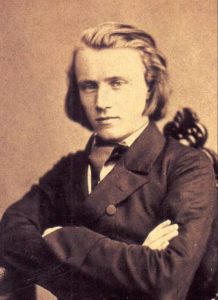
Johannes Brahms
Musicians often refer to Bach, Beethoven, and Brahms as the “three Bs.” Bach and Beethoven have clearly earned their reputation as composers of great genius, but what places Brahms alongside them in the Pantheon of composers?

Personal Data
Dates: 1833-1897
Born: Heide, Germany
Residence: Vienna
Brahms attained international fame in his lifetime as one of the most prominent composers of his day, but his music was subject to much criticism—we could even say attack—not for being too modern or edgy, but for being stuck in the past.
An ideological clash we call the “War of the Romantics” divided music into two camps and was waged viciously among musicians and in the press. The “New German School” lionized the music of Liszt and Wagner inspired by literature, legend, and drama. It had cast off the shackles of classical form. Brahms, on the other hand, became the most prominent representative of the competing camp: those who held to traditional forms of Mozart and Beethoven.
The symphonies of Beethoven, who died in 1827, had cast a giant shadow over the musical landscape. Who could produce new works in the mold of Beethoven that would not suffer by comparison? Several innovative composers who called themselves the New German School avoided that trap by turning to new forms. Liszt composed colorful tone poems loosely based on a narrative. Wagner revolutionized opera in almost every way possible. But Brahms followed the Viennese Classicism of Beethoven and emerged as his rightful heir.
Brahms was keenly aware of the pitfalls in writing a “new” symphony and moved cautiously. Always a perfectionist, he hesitated, or struggled, to complete his first symphony. He worked on the symphony for 15 years. When it premiered in 1876, Brahms was 43 years old and already famous for many other works. His second symphony appeared a year later. He wrote the third in a period of four months in 1883 and completed the fourth, his last, a year later. All four of the Brahms symphonies rank among the finest in the repertoire.
The same can said of Brahms’ piano music, chamber music, concertos and other orchestral works. Brahms also excelled as a composer of Lieder (songs), taking his place alongside Schubert and Schumann.
Although Brahms championed older Classical forms in a Romantic age, he was not simply old-fashioned. He continually explored new vistas in harmony and rhythm. Also, he was a superb melodist, able to extend musical lines that at times seem endless and to weave multiple melodic lines gorgeously together. The influence of his style can be seen in his contemporaries and successors, notably Mahler, Bruckner, Elgar, and Dvorak.
Timeline
Academic Festival Overture
Brahms never attended a university, although he soaked up the college atmosphere in Göttingen by spending time with his friend, the great violinist Joachim. The University of Cambridge offered him an honorary doctorate in 1876 (yes, that practice existed back then), but Brahms declined to travel to England to receive it. In 1879, the university in Breslau (now Wroclaw, Poland) awarded him an honorary doctorate, so Brahms decided to compose the Academic Festival Overture to mark the occasion. The piece incorporates four college songs and, as his most light-hearted and humorous work, seems like a good introduction for this page.
(You must be logged into the Circle of Scholars to view the rest of this page.)
